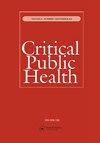Emotions of burden, intensive mothering and COVID-19 vaccine hesitancy
IF 2.3
3区 医学
Q2 PUBLIC, ENVIRONMENTAL & OCCUPATIONAL HEALTH
引用次数: 4
Abstract
ABSTRACT Addressing mothers’ vaccine hesitancy, which is a state of indecision rather than refusal, may become critical to public health responses to the COVID-19 pandemic. Extant research separately examines how intensive mothering ideology and emotions interact with childhood vaccine hesitancy; however, little is known about the emotions at the intersection of motherhood and vaccine hesitancy. To address this, we seek to understand the emotions experienced by COVID-19 vaccine hesitant mothers who experience the societal pressures arising from the ideology of intensive mothering. Interviews (n = 30) were conducted with women in Australia who identify as mothers and self-report to have concerns about COVID-19 vaccination of their children. The findings suggest ‘emotions of burden’, specifically fear of being a ‘bad mother’ and anticipated guilt about failing to be a ‘good mother’, are experienced by mothers striving to meet societal expectations of intensive mothering though their vaccination decision. These findings provide a more nuanced understanding of mothers’ experiences in making vaccination decisions for their children and lends further empirical support to critiques of intensive mothering ideology as well as public perceptions of vaccine hesitant mothers. Practically, public health campaigns that avoid intimations of ‘bad mothering’ and acknowledge how emotionally burdensome the COVID-19 vaccination decision can be for vaccine hesitant mothers are indicated.负担情绪、密集育儿和COVID-19疫苗犹豫
解决母亲的疫苗犹豫(一种优柔寡断而非拒绝的状态)可能对应对COVID-19大流行的公共卫生措施至关重要。现有的研究分别考察了强烈的母亲意识形态和情绪如何与儿童疫苗犹豫相互作用;然而,人们对母亲身份和疫苗犹豫之间的情绪知之甚少。为了解决这个问题,我们试图了解COVID-19疫苗犹豫的母亲所经历的情绪,她们经历了密集育儿意识形态带来的社会压力。对澳大利亚的女性进行了访谈(n = 30),她们认为自己是母亲,并自我报告对子女的COVID-19疫苗接种感到担忧。研究结果表明,“负担情绪”,特别是害怕成为一个“坏母亲”和对未能成为一个“好母亲”的预期内疚,是那些通过接种疫苗决定努力满足社会对强化母亲的期望的母亲所经历的。这些发现提供了对母亲为子女做出疫苗接种决定的经验的更细致的理解,并为对密集的母亲意识形态的批评以及公众对疫苗犹豫不决的母亲的看法提供了进一步的经验支持。实际上,公共卫生运动避免暗示“不良母亲”,并承认COVID-19疫苗接种决定对疫苗犹豫不决的母亲来说是多么沉重的情感负担。
本文章由计算机程序翻译,如有差异,请以英文原文为准。
求助全文
约1分钟内获得全文
求助全文
来源期刊

Critical Public Health
Multiple-
CiteScore
5.90
自引率
7.10%
发文量
36
期刊介绍:
Critical Public Health (CPH) is a respected peer-review journal for researchers and practitioners working in public health, health promotion and related fields. It brings together international scholarship to provide critical analyses of theory and practice, reviews of literature and explorations of new ways of working. The journal publishes high quality work that is open and critical in perspective and which reports on current research and debates in the field. CPH encourages an interdisciplinary focus and features innovative analyses. It is committed to exploring and debating issues of equity and social justice; in particular, issues of sexism, racism and other forms of oppression.
 求助内容:
求助内容: 应助结果提醒方式:
应助结果提醒方式:


